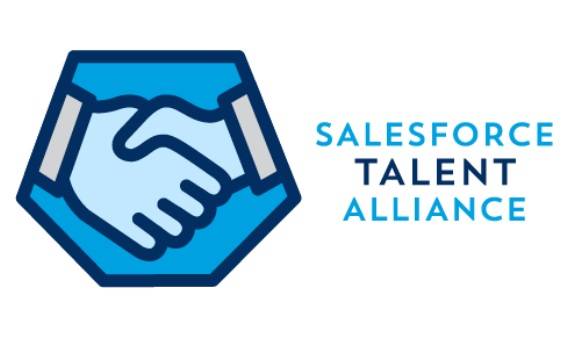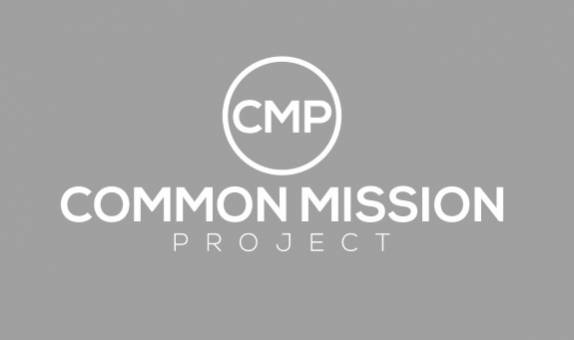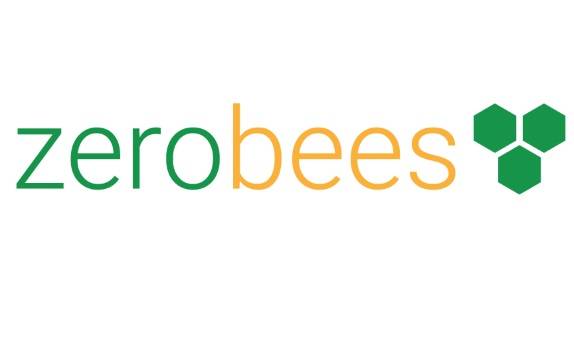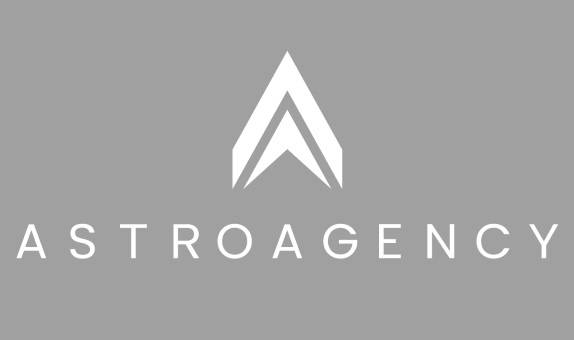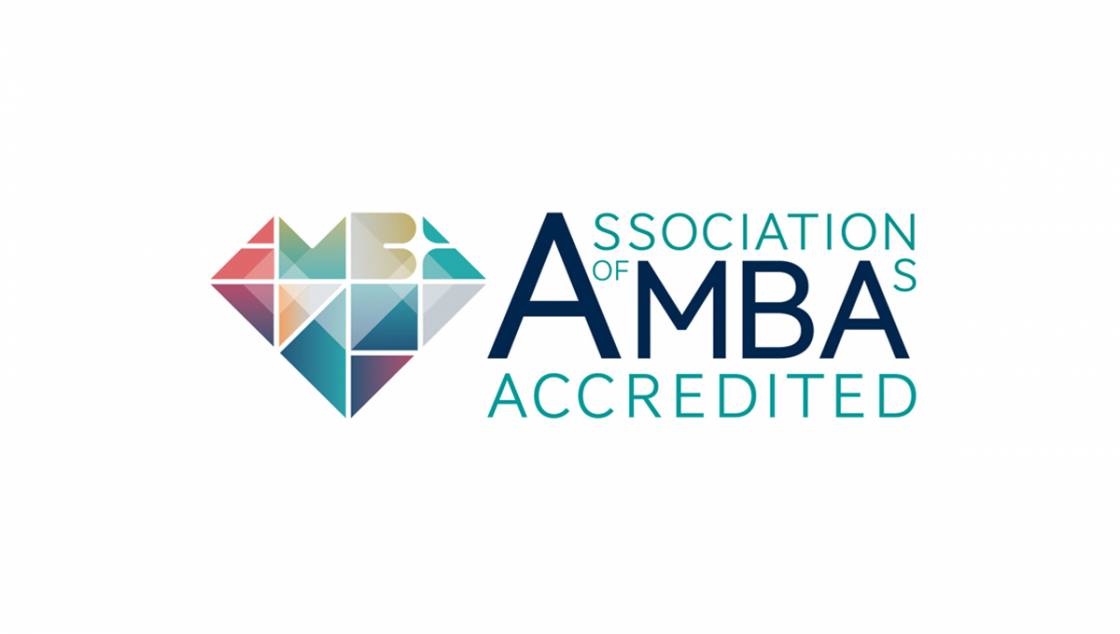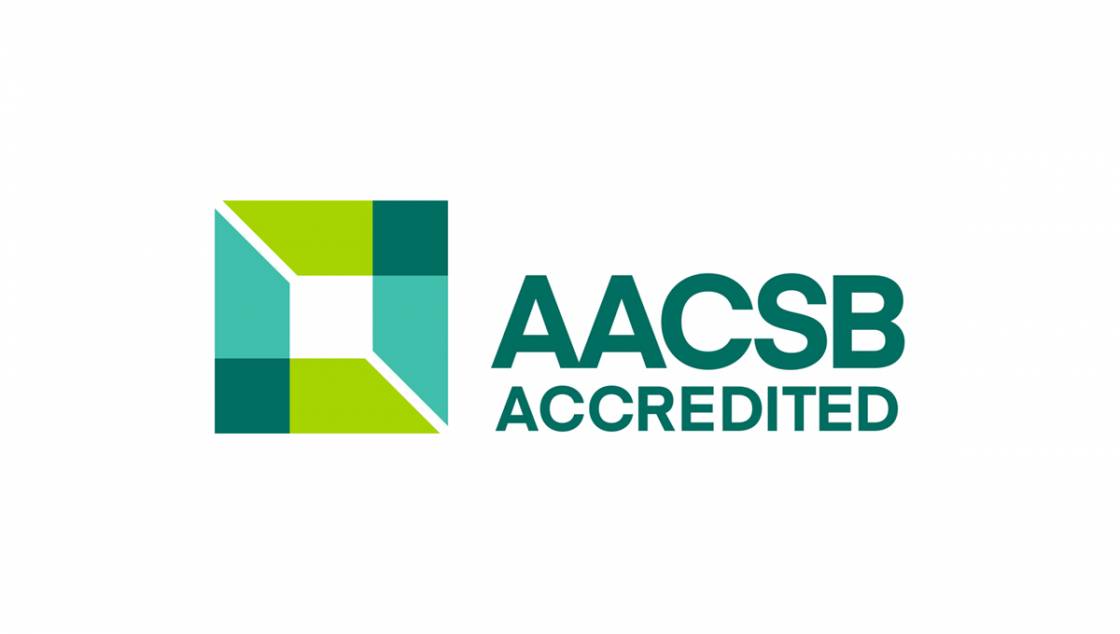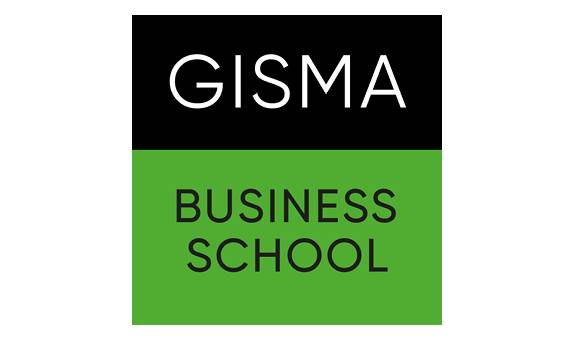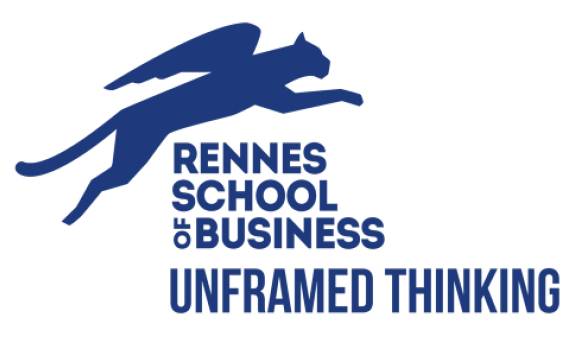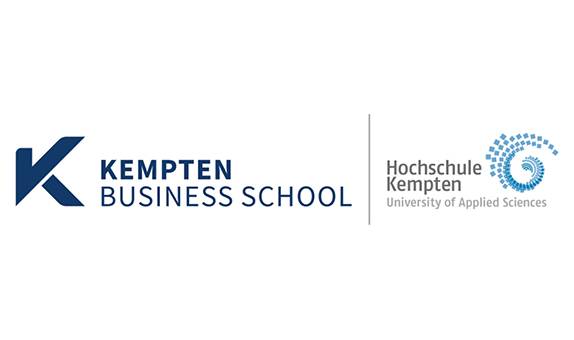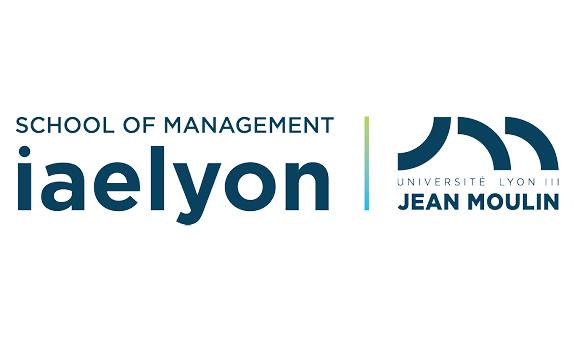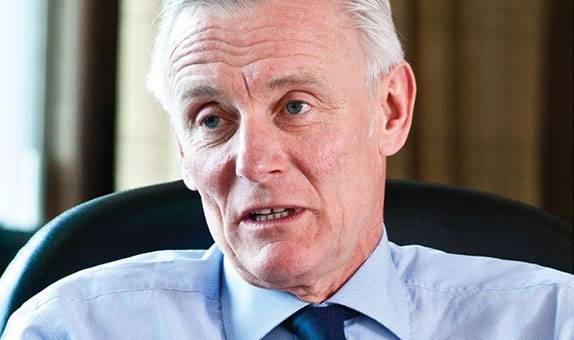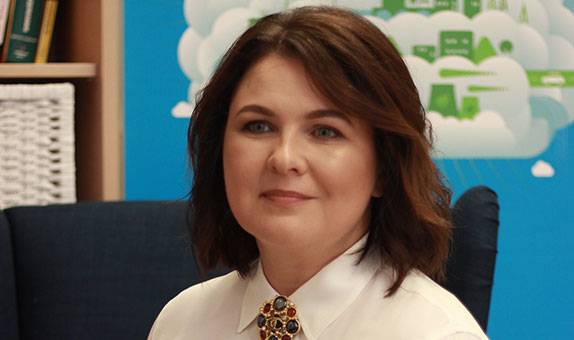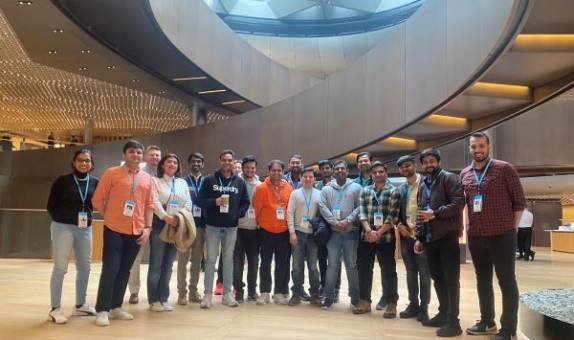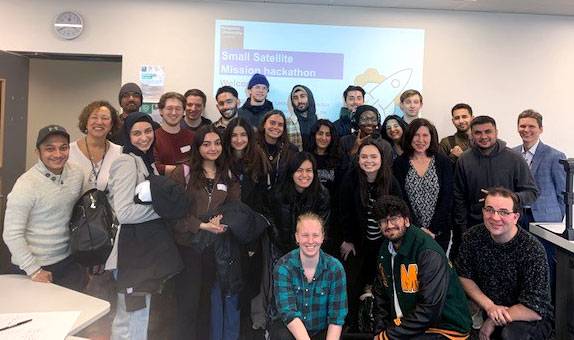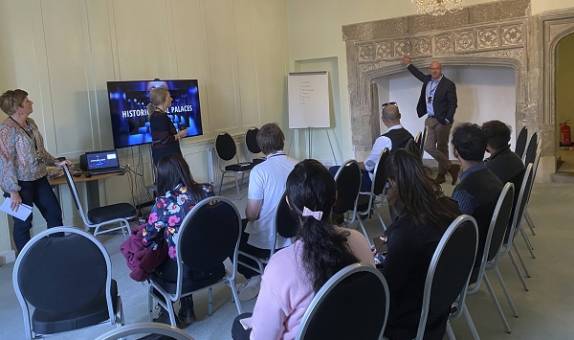Master of Business Administration (MBA)
Why choose this course?
Business innovation and leadership transformation are the driving forces behind our Kingston Master of Business Administration (MBA).
Build a tailored MBA, whether you work for a large organisation or are planning your first start up. High-quality, informed teaching will give you practical skills, help you make effective business decisions, think creatively and find solutions to real-life challenges.
Sustainability and ethical business are incorporated throughout the course, and you can choose to study specialist modules in digital intelligence. Kingston Business School has a strong focus on innovation and entrepreneurship, including an incubation programme and co-working space.
MBA
| Mode | Duration | Start date |
|---|---|---|
| Full time | 1 year |
November 2024 January 2025 |
| Full time | 1 year |
March 2025 September 2025 |
| Part time | 2 years |
November 2024 January 2025 |
| Part time | 2 years |
March 2025 September 2025 |
| Full time | 2 years including professional placement |
November 2024 January 2025 |
| Full time | 2 years including professional placement |
March 2025 September 2025 |
| Main Location | Kingston Business School, Kingston Hill |
The Kingston MBA
Reasons to choose Kingston University
- This course is accredited by AMBA, the global standard for all programmes.
- An MBA at Kingston will develop your personal capacity and leadership skills, and help you build a career plan to meet your ambitions.
- Kingston Business School is one of only 5% of the world's business schools to be accredited by AACSB International.
- If you are a self-funded student, you may be eligible for a tuition fee scholarship of £3,000.
- Free car parking at the Kingston Hill campus is available for students of this course. The campus can also be easily accessed by public transport. Halls accommodation is just a walk away from the classrooms.
MBA at Kingston University
Course leader Pauline and former student Barbara talk about the MBA at Kingston.
What you will study
Through the MBA, we aim for our students to actively analyse, question, interpret and innovate. This course will prepare you to identify and embrace potential opportunities whilst developing your creative capacities and collaborative approach in order to be successful in different environments.
This full-time MBA programme is structured across 12 months. Teaching takes place in blocks, with weekday daytime classes, seminars and workshops. You will also attend a summer school in July each year to study your electives. An optional second year is available, in which you can complete a Professional Placement.
Part 1
Part 2
Year 2 (optional)
Part 1 aims to develop a foundation in general management, including skills and perspectives across business function areas. It includes eight integrated subjects which develop your understanding of theory and practice, to enable you to achieve a corporate perspective of your enterprise.
Core modules
Big Data and Business Analytics
15 credits
This module is designed to introduce business students to the exciting world of business intelligence and big data science with a particular focus on its use to inform strategic decision-making policies. Today's managers need to understand where and how to use business intelligence and big data analytics, to allow them to utilise new sources of customer, product, and operational data, which coupled with data science will allow them to optimise key business processes and KPIs.
Organisations and Management in a Global Context
15 credits
This module introduces you to a systemic approach to identifying, understanding and analysing macro, meso and micro issues, set within the global context, which have significant implications for the successful management of organisations and the people within them to produce appropriate detailed recommendations for organisational implementation.
Financial Management
15 credits
This module will help you develop and enhance your critical understanding of a range of topical issues associated with financial management. You will do this by reviewing and analysing the position and performance of organisations as revealed in their financial statements and stock market indicators in the case of listed companies or key performance indicators in the case of not for profit organisations. In addition you will explore recent theoretical frameworks and empirical evidence concerning financial management issues to be found in the academic literature and then you will work to make sense of these in a practical context. You will engage with a broad range of issues, from financial reporting, through accounting for management decision making in the short and long term, to considerations of decision making in the context of responsible capitalism and accounting for and with sustainability issues.
Operations Management
15 credits
This module is core on the MBA. The module introduces you to the nature and scope of operations management within private and public sector operations in both service and manufacturing environments. The module explores operations strategy, process and capacity issues, supply chain management and improving operations.
Digital Marketing Practice
15 credits
The module aims to provide aspiring senior managers with an appreciation of the likely multidisciplinary impact of digital transformation on the overall customer experience and the need to develop future marketing executives possessing the necessary skills and capabilities, namely IT skills, to comfortably communicate across the different business functions ensuring that all digital platforms achieve optimal customer centricity.
Responsible Management
15 credits
The module provides a critical understanding of the concepts of business ethics, corporate social responsibility (CSR), and stakeholder management and enables you to analyse, evaluate, and formulate business decisions in the light of ethical and societal considerations. It will enable you to manage organisations and your activities in a socially responsible way through the ability to evaluate CSR practices as applied to various business issues.
Strategic Management
15 credits
This module is a core module for the Master of Business Administration. The module explores how an organisation could develop widely supported and high quality decisions in a manner that would ensure its ability to succeed and remain sustainable. The module also helps you to learn how to translate a strategy into action in organisations and engage with the challenges that the implementation of strategy brings about in order to ensure sustainable success in a rapidly changing environment.
To achieve this we will be examining a number of conceptual and analytical approaches and models to help us understand the assets and capabilities of the organisation, and its relationships with suppliers, customers, regulatory bodies and other firms. Following on from this analysis we will consider the issues involved in understanding and designing strategic options and introduce a number of ideas as how the execution of strategy should be understood and related to different activities of the organisation that relate to the implementation of its different strategic options in terms of people, processes and technology.
Enterprise and Innovation
15 credits
Students learn the necessary skills to build and scale a successful business. This includes how to develop ideas, build prototypes, and understand what customers truly want. The focus of the teaching and student experience is around hands-on learning and entrepreneurial activity. Students are given the opportunity to attend guest lectures with practising entrepreneurs and intrepreneurs to gain practical understanding towards making innovation happen. Support will be given through the Kingston University flexible office space for entrepreneurial start-ups, drop in advice, training and challenges.
Assessment is through coursework, presentations, business prototypes and completion of the entrepreneurial process.
Part 2 will develop further practical management skills through the delivery of the Management Consultancy Project.
It also includes two electives, enabling you to personalise your studies to match your career path and future aspirations.
Running throughout your MBA studies, the Career and Leadership Journey module will support you in your personal and professional development whilst refining your executive leadership and professional skills.
Core modules
Management Consultancy Project
30 credits
This is a core module in the MBA programme. The module consists of taught sessions on theory and practice of management consulting, as well as business research methods and a set of activities to support MBA candidates in the development of their consultancy project. As such it looks at the relevant business research and analysis instruments and processes of sourcing and delivering consulting work. Perspectives of both consultant and client in a typical engagement are considered. The material provides solid theoretical and practical background to those wishing to pursue management advisory work on a professional basis.
Career and Leadership Journey
0 credits
The Career and Leadership Journey module runs throughout your studies at Kingston and aims to support you in your personal and professional development through an emphasis on the refining of leadership, teamworking and the acquisition and refining of executive and professional skills. It also aims to prepare Senior Apprentices to meet Behavioural Standards for their End Point Assessment (EPA). The module builds on the recommendations of joint research undertaken by the Chartered Association of Business Schools (ABS) and the Chartered Management Institute (CMI) aimed at meeting the growing demands from employers for business schools to produce more professionally adept managers and leaders. You will develop a number of valuable transferable skills via a series of workshops, each focused on a different aspect of your leadership, managerial and professional development, and help you develop as an individual those areas of most relevance to you. Throughout your journey you will also be able to track and assess your own individual progress. Module workshops and other activities are delivered by a range of academics and practitioners.
Elective modules (choose 2)
Corporate Finance
15 credits
This Corporate Finance module is an elective available to course members of the MBA programme, both full-time and executive versions. The module has been designed and developed to provide course members with an opportunity to explore the theory and practice of corporate financial strategy and the link with corporate strategy. A blended learning strategy will be utilised, involving a combination of classroom based learning, independent and group study, together with tutor-student and student-student interaction via Canvas. Where and when possible, corporate finance practitioners will lead one or more session, offering course members the opportunity to explore at first-hand how analytical frameworks and models are applied in the practice of financial strategy and decision making.
Project Management
15 credits
In this module we look at how to use project management to deliver strategic change in organisations and thereby achieve performance improvement. We consider how strategic change can deliver performance improvement and identify the change required to deliver it. We then describe how to plan and manage a project to deliver the change. We consider how to define, plan and organise the project, and how to engage the stakeholders. We then describe how to manage time, cost, quality and risk. Projects usually take place as part of a portfolio or program of projects, so we describe how to manage them. We also cover the development of the business case and benefits realisation management. Portfolios and programs are a key governance mechanism in the project-oriented organisation, and so we place them in the context of governance. They are also key for translating corporate strategy into project strategy, and for ensuring project objectives are linked to corporate objectives.
Change and Creativity
15 credits
Why do organisations need to change; to become more creative and innovate? How can management help people to achieve their new ideas and practices in a creative and imaginative way?
Change is a defining feature in contemporary organisations, posing key challenges and questions for all sorts of businesses, communities and societies. Implicit in change is the ability and capacity to act creatively in order to maintain healthy organisations. Therefore, to learn more about how organisations change, how to manage it, how people understand it; and, the complexities involved in acting and enacting change through creative processes becomes an essential feature of organisations in order to succeed in the 21st century. All of these exciting issues are explored in this module focusing on both, the epistemological and ontological aspects of creativity and change.
Global Immersion
15 credits
This module is designed to introduce the students to key theoretical and practical aspects of human interaction occurring across cultural boundaries in a global context. It provides a structured approach to identifying, reflecting and analysing students' first-hand knowledge and experience about the culture and commerce of another country, thus developing their ability and confidence to work in the global work environment.
Winning and Retaining Customers
15 credits
The module introduces students to the core concepts of customer acquisition and retention in different contexts, namely business-to-business (B2B), business-to-consumer (B2C) and service settings. It builds on the knowledge acquired from the Marketing Principles and Practice module, examining how organisations are able to create value for their customers as well as other stakeholders. The module examines the importance of understanding the contemporary marketing environment before developing strategic plans to retain existing, and acquire new customers.
The module critically evaluates traditional marketing theories in their role of creating value. More advanced theories are introduced to evaluate customer value creation: specifically, relationship marketing, business networks, services marketing and value co-creation within service-dominant logic.
Having identified appropriate theories, relevant concepts such as Customer Relationship Management (CRM), Key Account Management (KAM), multi-channel architecture and digital media will be discussed. The importance of segmentation in new marketing environments is explored including issues of Big Data. The module concludes with an analysis of the relevant marketing and financial metrics needed to ensure effective management of the customer/business relationship.
Supply Chain & Logistics Management
15 credits
This module aims to develop students' ability to understand how to plan, implement and control the most effective and efficient flow of products and services. This module will help students develop decision making skills in the structuring of strategic and tactical options for organisations engaged in various supply chain and logistics activities. Class will be delivered by the combination of lecture, discussion of case studies, and students' presentations. This module considers how the theoretical aspects and methodologies of logistics and supply chain management can be applied into the real life practices. This module will be assessed through group presentation and individual assignment. Formative feedback on how well they do this will be provided in class.
Global Business
15 credits
This module examines international business issues and the phenomenon of globalisation from a strategic perspective. On one hand, this module investigates the issues from a macro-level, looking at the trends of international trade and foreign direct investment, emergence of emerging markets and how they interact with or impacts on the global economy, and the role of international institutions such as regional economic trade blocs and the WTO. The impacts of these on businesses are then considered. On the other hand, this module also discusses concepts and theories that could be used to help firms make internationalisation decisions and formulate appropriate internationalisation strategies.
The emphasis of this module is on integration and reflection. During the delivery of the module contents, students will be constantly encouraged to share their experience in classes in relation to the issues discussed on the module and reflect in a critical manner how theories and the real world relate with one another. The ability of students to integrate and reflect is further stimulated, developed and enhanced by class discussion and the assignment, which requires the students to write a critique on an academic article, discussing with a critical mind the importance and applicability of the theoretical concepts/issues in the article to real business cases that they are familiar with.
Development and Growth of SMEs
15 credits
The potential for growth is a defining feature of the entrepreneurial small and medium enterprises (SMEs). This module is concerned with the issues and decisions that the entrepreneur must consider in successfully managing the growth and development of new SMEs. The module is designed to cover four broad and interrelated issues: a) the process of business growth of SMEs, b) barriers to business growth of SMEs; c) internal strategies for the growth of SMEs, and d) external strategies for the growth of SMEs. The course will draw on materials from the literature on entrepreneurship to provide a basis for a critical understanding of the concepts and strategies for entrepreneurial venture growth and development.
Venture Capital and Start-up Fundraising
15 credits
Venture capital and Business Angel finance has been the driving force behind some of the most vibrant sectors of the economy. Companies famous for receiving venture capital or business angel funding early in their development include Apple, Microsoft, Google and Amazon. US and Western Europe no longer dominate the industry and emerging countries such as China, India and Russia are fast catching up. Recently, the explosion of Crowdfunding platforms has signalled a new era for the innovation finance industry. This module analyses all stages of the funding ladder for innovative companies, from Crowdfunding, Business Angels, Venture Capital, Private Equity to IPO or M&A. It examines the main forms of innovation finance and the investment process; how private equity and venture capital funds, business angels and crowdfunding platforms work; how firms become investment ready, raise external finance and how to they finally exit. Students also learn about wider framework conditions that have a bearing on business innovation, including availability of finance for innovation, public policies and agencies promoting innovation.
High Performance Leadership
15 credits
This module is an elective on the MBA. The module introduces students to the nature and scope of High Performance Leadership within private and public organisations, and explores how organisations can create and sustain success.
Interactive Marketing
15 credits
In today's business world, a large number of organisations base their strategic initiatives on various digital business models, sometimes transforming whole industries in the process. In addition, many other successful organisations use Interactive Marketing as the core of their marketing strategy and/or to complement and extend their offline marketing activities. Thus, understanding the theory and practice of Interactive marketing has become an essential element of modern marketing.
In this module, you will:
- Understand Interactive Marketing and its role in modern marketing
- Examine the theory and practice of Interactive marketing and compare where appropriate with traditional or offline marketing
- Develop a working knowledge and understanding of the application of Interactive Marketing strategies and techniques
This professional placement year is optional. It takes place after the full time MBA year. It enables you to do a 12-month work placement as part of your course. The work placement is an assessed part of the course and is therefore covered by a Student Route visa.
Find out more about the postgraduate work placement scheme.
Core modules
Professional Placement
120 credits
The Professional Placement module is a core module for those students following a masters programme that incorporates an extended professional placement that follows completion of the first 180 credits of taught modules and project or dissertation. It provides students with the opportunity to apply their knowledge and skills in an appropriate working environment, and to develop and enhance key employability skills and subject specific skills in their chosen subject.
It is the responsibility of individual students to locate and secure a suitable placement opportunity; this will normally involve one placement which must be completed over a minimum period of 10 months and within a maximum of 12 months. The placement must be approved by the module leader prior to commencement to ensure its suitability.
Please note
Optional modules only run if there is enough demand. If we have an insufficient number of students interested in an optional module, that module will not be offered for this course.
Industry partners
We are proud of our collaborations with a range of organisations from various industries. This ensures that we can provide invaluable opportunities for students, from live project briefs and guest lectures, to experiential visits and networking events.
About the Department of Strategy, Marketing and Innovation
The Department of Strategy, Marketing and Innovation comprises passionate and enterprising academics from a diverse range of backgrounds. Our undergraduate and postgraduate qualifications bring together research, practitioner insights and teaching expertise in the disciplines of marketing, international business, entrepreneurship, strategy and innovation.
Our courses are truly experiential, providing you with opportunities to undertake company visits, attend networking events and hear best practice from industry guest speakers.

International Fortnight
All Kingston MBA students come together for our annual International Fortnight. Taking place on campus, during International Fortnight you will study and socialise with other MBA students. Building on the knowledge you've gained so far on your course, you will immerse yourself in your choice of specialist elective modules and hear from inspiring guest speakers. Previous attendees have also had the opportunity to take part in exciting company visits.
Entry requirements
We advise that candidates apply for the Kingston MBA as soon as possible – it can take longer than you think to get organised to start your MBA. We accept admissions throughout the year, so you can join the next available group of students when you are ready.
The Kingston MBA is a generalist course that is offered as a full-time programme. Our specific MBA admissions criteria reflect the fact that students on the programmes often have different academic and business backgrounds.
Specific MBA admissions criteria
Committing to an MBA is a huge, life-changing decision. We want your experience on the Kingston MBA to be challenging, enjoyable and rewarding, so making sure we select both the right students and the right mix of students is extremely important. We use a set of admissions criteria to determine if a student is ready to take on an MBA. The criteria help us to make sure that you can successfully complete the MBA, and that each cohort of students will work together successfully as a team.
| Area | Requirement | You need to provide: |
|---|---|---|
| Academic |
First degree or recognised equivalent from a professional body. | Certified copy of your degree, transcripts, or letter of award. |
| We also consider applications from individuals with considerable management experience but no first degree. | Evidence of alternative professional development and achievement. | |
| Work experience | Minimum of three years' relevant work experience for the full-time programme or five years' managerial experience for the executive programme. | |
| English proficiency | Very proficient written and spoken English. | Applicants whose first language is not English are expected to meet our requirements for English language proficiency (see below for details). |
| Motivation | The MBA is a big commitment. We need to know you have thought about the opportunity and the consequences of studying. | Personal statement (750 words maximum) within application form. Interview to discuss the suitability of the MBA for you. |
Teaching and assessment
Course accreditation
The Kingston MBA has been accredited by the Association of MBAs (AMBA) since 1984 – one of the first UK MBAs to achieve this endorsement. Joining Kingston's MBA programme opens the door to lifetime membership of the Association of MBAs (AMBA) and a global alumni network.
The AMBA is the leading accreditation body in the UK and is receiving increasing recognition across Europe. It provides an independent, international verification of quality which assures employers that our MBA is well respected and up to date.
Kingston Business School Accreditations
Kingston Business School holds the prestigious international accreditation by the AACSB (Association to Advance Collegiate Schools of Business) in recognition of the excellence of its business education. This accreditation has been earned by just 5% of the world's business schools and recognises the high quality and standard of our business degree offerings.
Kingston Business School: be who you want to be
Partner institutions
We have close partnerships with esteemed institutions in Germany and France. MBA students can take on an elective module in a different cultural setting and experience different approaches to learning, whilst broadening their personal and professional network.
Who teaches this course?
You will be taught by an experienced teaching team whose expertise and knowledge are closely matched to the content of the modules on this course. The team includes senior academics and professional practitioners with industry experience. The following group of staff members are currently involved in the delivery of different elements of this course. This pool is subject to change at any time within the academic year.
Course fees and funding
Additional costs
Depending on the programme of study, there may be extra costs not covered by tuition fees. Students will need to consider these costs when planning their studies. Tuition fees cover the cost of your teaching, assessment and operating University facilities such as the library, access to shared IT equipment and other support services. Accommodation and living costs are not included in our fees.
Where a course has additional expenses, we make every effort to highlight them. These may include optional field trips, materials (e.g. art, design, engineering), security checks such as DBS, uniforms, specialist clothing or professional memberships.
Alumni destinations
The Kingston MBA empowers its graduates to advance their careers in a variety of ways, according to their individual career aspirations. Many graduates use the knowledge gained from the Kingston MBA to help them operate more effectively at a higher level of senior management, either within their existing industry, or taking the opportunity to transition into a new role/ sector. Others use these skills to successfully set up their own business, expand into a consultancy role within an existing firm, or set up their own consultancies.
Examples of well-known organisations our alumni have worked for include:
- GSK
- AstraZeneca PLC
- RBS
- Tata Consultancy Services
- NHS
- Amazon Internet Services PVT Ltd
- Occidental Petroleum
- MS Amlin
- SberBank
- BTS Telecom
- Deloitte Digital
- EY.
The types of role our alumni have held following the MBA vary greatly according to the individual's experiences and area of expertise. A selection of positions held by Kingston MBA alumni include:
- director of technical sales
- finance director
- head of brand marketing & acquisition
- CEO
- head of operations
- CTO
- regional business manager
- director of services
- chief operating officer
- IT business relationship manager
- group chief executive officer.
Our MBA Alumni
Upon graduation you'll be joining an elite network of Kingston MBA alumni linking you up with future business colleagues and your next job role. We take great pride in the success and stories of our MBA Alumni:
Life on this course
What our MBA students say
Course changes and regulations
The information on this page reflects the currently intended course structure and module details. To improve your student experience and the quality of your degree, we may review and change the material information of this course. Course changes explained.
Programme Specifications for the course are published ahead of each academic year.
Regulations governing this course can be found on our website.



